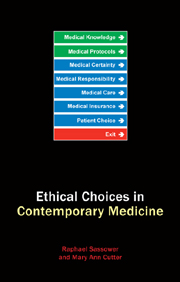3 - Medical certainty revisited
Summary
As we have illustrated in Chapter 2, epistemological questions in general have multiple answers that affect how we think about ethics and how we behave as humans. In particular, we argued that debates and controversies that are found in the medical context are in fact predicated on epistemological debates and controversies and are usually informed by rich historical backgrounds that implicitly affect those who face them. This argument was historically anchored and was replete with examples from the diagnostic arena. How are diseases classified and how are they treated? What goes into the classification of an ailment as a disease with a specified set of causes? What turns it into an entity that can be isolated from the rest of one's physical and mental health? In this chapter we plan on focusing on one particular epistemological issue – certainty – that is significant for the methods of inquiry we use and for the goals we have in mind when we launch a scientific investigation (rather than a personal exploration or quest for peace of mind).
We probably should be clear that our approach here is deliberately limited to what some call an immanent critique of the scientific approach to medicine. By immanent critique, as some in the Frankfurt School have called it, we mean a critique internal to the workings of the field, rather than a critique that would reach out to the spiritual or the transcendent elements or features of human existence.
- Type
- Chapter
- Information
- Ethical Choices in Contemporary MedicineIntegrative Bioethics, pp. 71 - 103Publisher: Acumen PublishingPrint publication year: 2007

